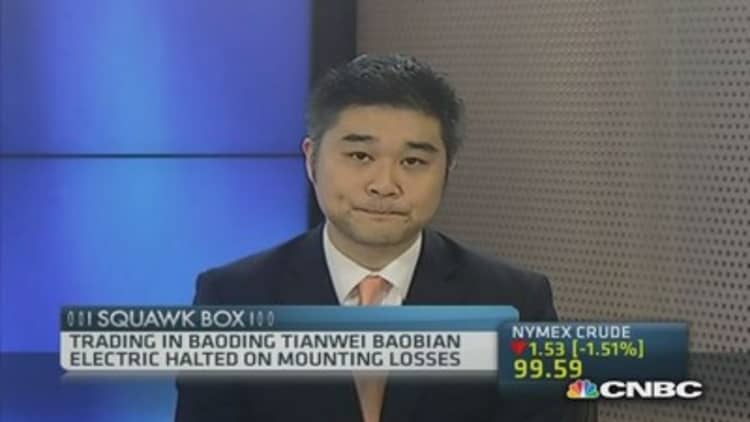
China's first corporate debt default in at least 17 years has sparked fear that the country's 'Lehman moment' is fast approaching, and Lombard Street Research says this is just the tip of the iceberg.
Shanghai Chaori Solar Energy Science & Technology failed to make an 89 million yuan ($14.5 million) interest payment on Friday. On Tuesday, another solar company announced a second year of net losses, leading some analysts to pinpoint the firm as the next domino to fall.
(Read more: China central bank ready to act if growth falters)
"The system is a house of cards that will collapse without change over the next few years," Diana Choyleva, head of macroeconomic research at Lombard Street Research said in a note titled 'China's bond default: the tip of the iceberg.'
China's debt problems have been a major concern for investors in recent years. The country's corporate debt hit a record $12 trillion at the end of last year, Standard & Poor's estimated, equivalent to 120 percent of gross domestic product. And as the figure accelerates in coming years, as analysts expect, so will the level of restructuring and defaults as companies sell assets and undertake mergers in a bid to pay their debts.
"It [the Chaori default] is likely is the tip of the iceberg," said Robert Prior-Wandesforde director of Asian economics research at Credit Suisse.
"We've all known for some time that there's been a huge unsustainable credit boom in China and it's going to affect large parts of the corporate world and large parts of the government sector as well," he added.
Although many analysts have long argued that the government has the firepower to step in and bail out troubled firms, others argue that the credit chains have become so long and convoluted it might be too challenging a task.
"The saving grace is that the central government is there to stand behind companies and local governments who are deemed to matter [But] it is a tangled web and it's not easy to sort out even for the Chinese government, but they can limit the damage," he added.
Hopes that authorities would take steps to reform its financial markets to make them more open and transparent were boosted after China's Third Plenum meeting in November, although no specifics were revealed, and economists argue that by allowing a company to default they are showing that they will be less inclined to interfere in the future.
But according to Choyleva, Chinese authorities have only taken the "easy step" by allowing a corporate bond issued by a private firm to default. If Beijing is committed to market reform, she said the market will need to see the default of a wealth management product or a bond issued by a state-owned firm.
"This is a challenging task, and it is difficult to see how it can be achieved without a liquidity and credit crunch as part of the adjustment process," she said.
(Read more: China faces delicate policy dance on shadow banking)

In her note, Lombard's Choyleva highlighted that China's bond market remained distorted and was unable to price risk appropriately.
Strict government controls, and the fact that state-owned companies own the bulk of government debt prevent the market from acting like a truly contested market, she said. Meanwhile, the same problem is prevalent in the corporate bond market, which is equally owned by banks, insurance firms and fund managers.
"The result is a manufactured spread between government bonds, state-owned firms' bonds and private firms' corporate bonds," she said.
(Read more: Get ready for more China shadow-banking defaults)
Choyleva pointed out that Chaori's bond was issued at a spread of 575 basis points which implies a default probably of 30 to 40 percent.
"For comparison, a similarly rated corporate bond in developed markets trades at [a spread of] 40-50 bps, pricing in a default probability of 3-4 percent," she added.
A major risk would be a sudden spike in inflation, which would mean banks - previously happy to hold bonds to maturity - would take a hit to their balance sheets and capital, encouraging speculation at every level.
— By CNBC's Katie Holliday: Follow her on Twitter @hollidaykatie


